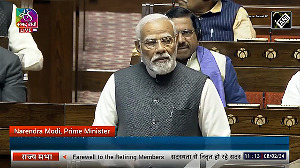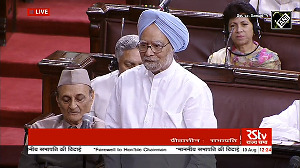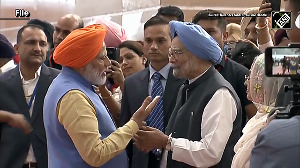 Director Sourabh Usha Narang passed away recently, robbing Bollywood of a fine talent. Raja Sen pays tribute to a friend who changed his life forever.
Director Sourabh Usha Narang passed away recently, robbing Bollywood of a fine talent. Raja Sen pays tribute to a friend who changed his life forever.
"Want to write a movie for me?" he asked, out of nowhere. I was flummoxed.
I'd reviewed Sourabh Usha Narang's Vaastu Shastra a few days ago, and the man was the first person I'd interviewed for Rediff. And here he was asking me to write a film.
Based on what, I wondered aloud, the writer inside me flattered at being propositioned thus, but equally perplexed by the randomness of it all, not to mention the terrifying potential for failure. But Sourabh laughed off all that. For he was a believer.
We'd hit it off a couple of weeks ago when I interviewed him at Ram Gopal Varma's Factory office, and a week after his visually-intriguing Vaastu Shastra released, he was already enthused about his next. Apparently, based on conversation and writing ("based on reviews?" I'd scratched my head) the man had inexplicably decided that I was to write his next film.
Was I ready for the plunge, he asked in that casually groundbreaking way of his: A way that asked whether you'd like to change the world, but did it so offhandedly you couldn't possibly refuse, because it sounded harmless and easy enough.
I caved, and remain forever grateful.
What I found with Sourabh, of course, was far more than a cinematic collaborator. Sourabh took me into his life, story-sessions turning into dinner parties, chats taking over cinematic discourses, books traded and stories swapped. He took on the elder brother mantle and watched over me, one of the only men to know the truth behind every rumour, and the secrets that made me tick.
He called me a special nickname derived from my mostly unused middle name, revelling in the fact that no one used it but him. And that's the way it'll stay.
And I have to get used to nobody calling me that anymore because he's gone.
I've tried and tried to reconcile myself to the facts, but I wept at Sourabh's funeral two weeks ago and nothing seems real anymore. I'd never lost a friend before, and here lay Sourabh, 37, a brother who even mentioned his stomach cancer diagnosis with a casual smile.
Priyanka, his wife, told me it's the first time she had been to a crematorium. Sigh. It's been devastating, and I can't believe he's gone.
We worked on a slew of unfinished projects, from a horror film script we both unashamedly loved to a realtime two-hour murder-thriller I wrote with much excitement and he viewed with much tolerance, to a romantic comedy slated to shoot this summer, dialogues for which I was writing four days before I heard the horrible news.
I have never wanted to direct a film, but now Sourabh's passing makes me wish I knew how to, if only to finish telling the stories he'd wanted to tell.
What remains most, thankfully, is his positivity.
The latter half of 2009 was an absolute mess as everyone I knew seemed to be giving me bad news: From the parents taking turns being hospitalised to a close friend losing his father to another one going through a bitter divorce, I was scared of reaching out to friends, terrorised by the possibility of more bad news. And then came a mail from Sourabh, talking about how I'd forgotten his birthday but also -- in that offhand way -- mentioning how he'd been diagnosed with cancer. It was heartbreaking.
I wallowed in helplessness until I met him a few weeks later. Sourabh, amazingly full to the brim with positivity, explained just why grief should be countered with smiles, about how you need to commiserate with a miserable friend but also need to be really, really solid for him, a strong, sunny anchor for the friend to hold on to.
Then, with a sly wink, he slipped a Dairy Milk into my pocket so I could shamelessly pretend to have brought it for his son, little Agastya -- a kid who wears red crocs largely because Raja Uncle does too.
In one evening, Sourabh changed the way I looked at things, with a line and a smile. For he was a believer.
He visited my parents in Delhi with his fantastic wife Priyanka and 'Gus, walking around the house and commenting on how much my baby pictures looked like his son -- and all this while a friend of my mother's, struck by the sight of Sourabh walking around in a shirt and shorts, asked who this cute schoolboy was. Well, he was big brother Sourabh, someone who apprised me on every life-changing decision I planned to take, and whose advice was always stellar.
Once, when I was attempting something particularly foolhardy, we made a deal where my success would mean treating him at the Mariott and failure would be treating him for a vada pao outside Andheri station.
For the record, he staunchly refused to collect that vada pao. For he believed that someday the bigger treat would come.
An articulate man, one of those debate-team whizzes who loved arguing and playing devil's advocate, Sourabh's cinematic vision was uncompromising. The horror film we wrote was stuck in perennial red tape, and the thriller a victim of ambitious casting dreams, but we toiled gleefully away at them all, enjoying the thrill of telling the story right.
Hundreds of afternoons were spent at his Mumbai flat as we drank tea, or walked across the road for a quick coffee. Coffee shops changed but the passion remained, and we'd talk every few days, even as he and I both moved on to other projects. At the time of his passing, two long-awaited ones were finally on hold, ready to roll. He loved irony, but how I wish it loved him less.
Every Friday, before I'd write my weekly review, he'd call me and ask for a two-line reaction on the film and, based on that or his own thoughts if he'd watched the film already, he would then send other friends an SMS predicting how many stars I'd give it.
I never know how many stars till I write the last line of my review. He beat me to it a clean 90 percent of the time, and I suspect the rest was him erring on purpose, trying to keep me from getting psyched.
Yet psyched I remain.
The last time we met, it was in a food court at a Mumbai mall, and we talked of his latest projects, scheduled to shoot as soon as the second round of chemotherapy was dealt with. Before that, we'd gone and watched a movie together and had a few laughs. He'd been looking better and better... and I just can't wrap my head around the fact that we won't be doing that again anytime soon.
The people who change your life saunter in unexpectedly, and Sourabh is startling evidence to that. In many ways the reason I'm still in Mumbai -- and definitely the reason I've stuck to movies for my lifeblood -- he taught me, indulged me and, most importantly, sparred with me.
I watched as Priyanka got pregnant and Sourabh's mother strictly stripped the walls of horror movie posters -- including his own Vaastu Shastra -- before Agastya was born. As was Sourabh's dream of seeing his son follow his filmmaking footsteps and eclipse his path.
'Gus, you have some big shoes to fill, but go on, make us proud.
As a writer, he was a massive influence and a terrific sounding board. As a screenwriter, he taught me an invaluable amount and honed my craft into some coherence. As a friend, I never had more fun arguing and obsessing with movies with anyone. As a brother, he took care of me, and I pledge to do the same for him, his family and his stories.
And writing this has been very, very hard to do. Because it involves trying to capture the essence of someone who meant a great deal to me, and who I can't think objectively about. Because it involves trying to let go, despite not wanting to. Because writing it means owning up to the fact that it's true, and he's gone. And because no matter how it's written, I don't like a word of it.
Rest In Peace, Sourabh.
And smile that infectious smile. For you made me a believer.
Also Read: Director Suparn Verma's tribute








 © 2024 Rediff.com -
© 2024 Rediff.com -